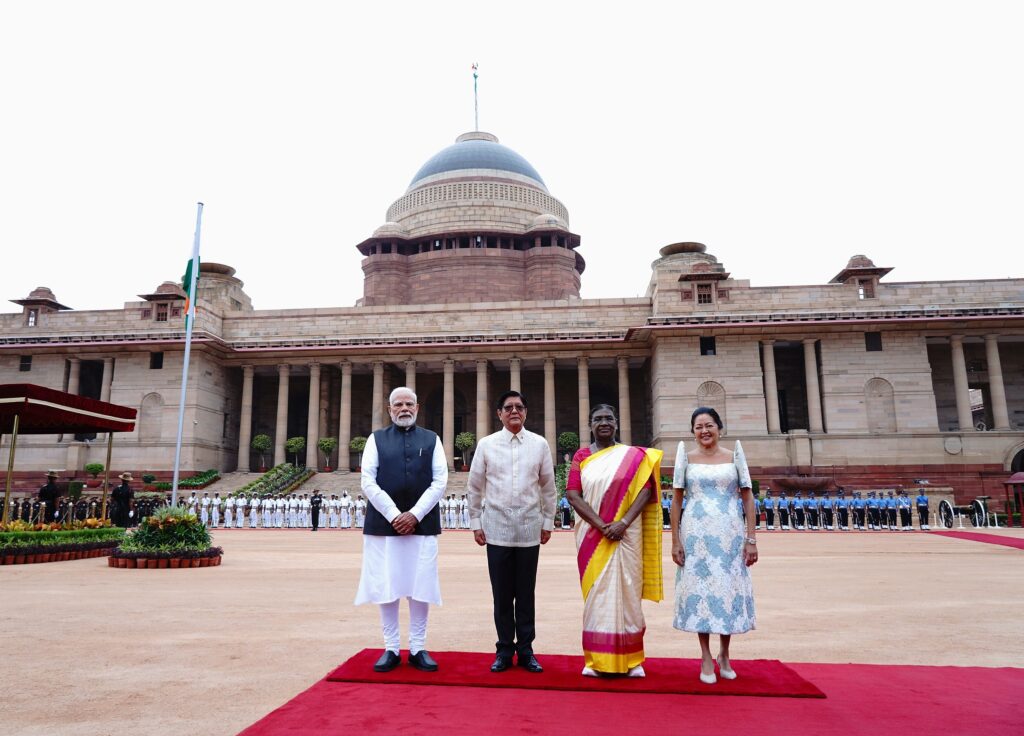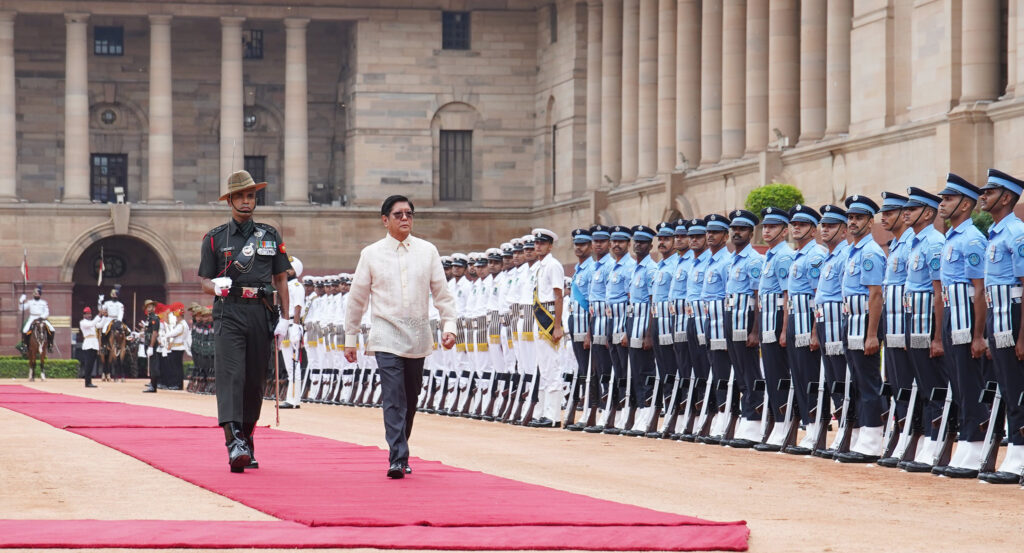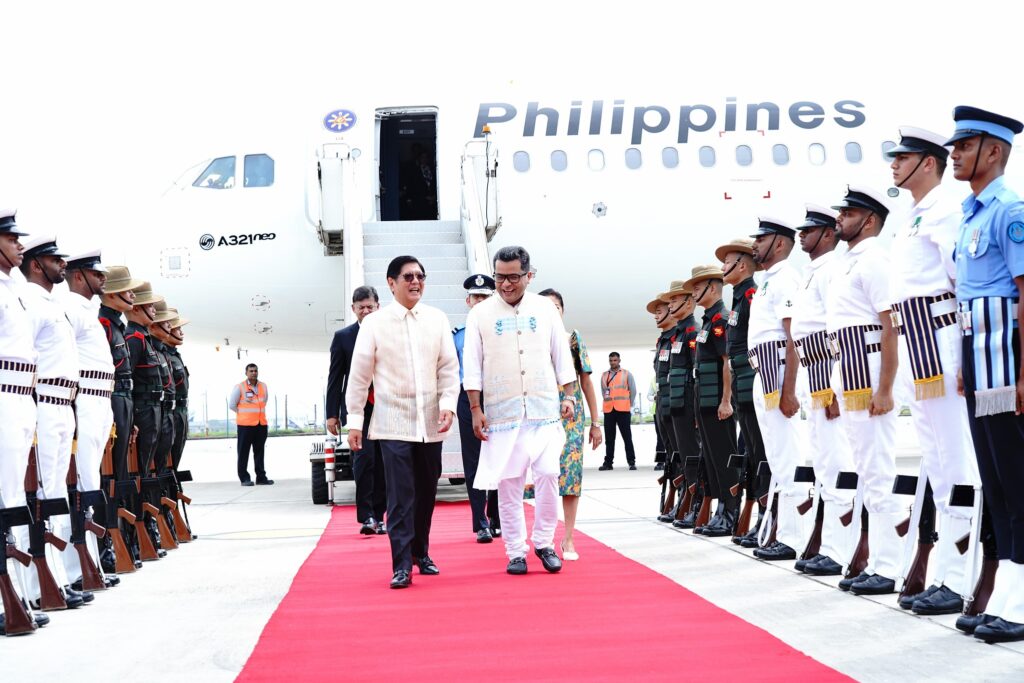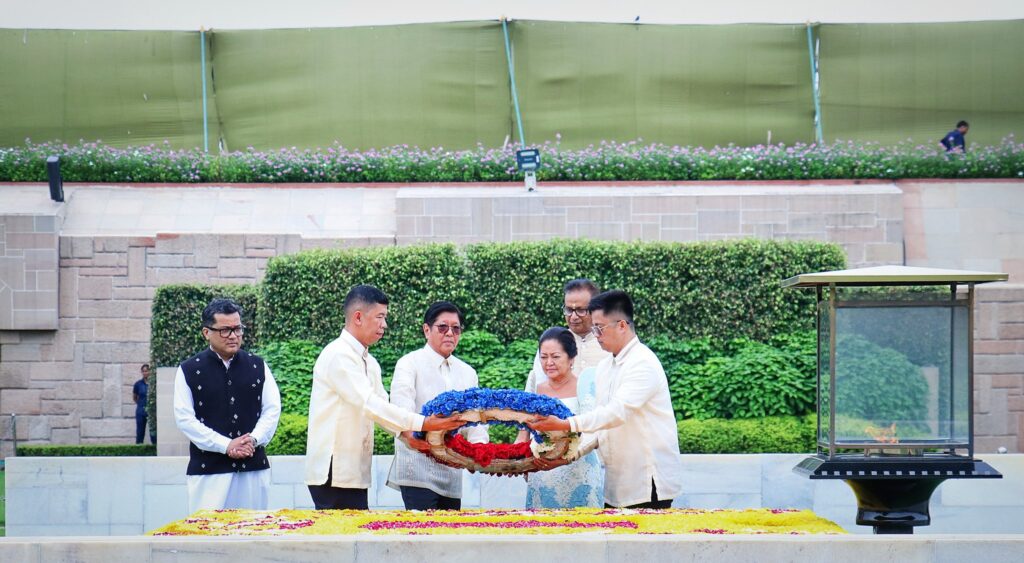
The visit marks 75 years of diplomatic relations with agreements on defense, trade, technology, and cultural cooperation
New Delhi, August 5, 2025 — The Republic of India and the Republic of the Philippines have formally elevated their bilateral relationship to a Strategic Partnership during the state visit of Philippine President Ferdinand R. Marcos Jr. to India. The visit, taking place from August 4 to 8, 2025, coincides with the 75th anniversary of the establishment of diplomatic relations between the two nations.


President Marcos, accompanied by First Lady Louise Araneta Marcos, several cabinet ministers, senior officials, and a business delegation, was received at the airport in New Delhi by Shri Pabitra Margherita, Minister of State for External Affairs. On August 5, he was accorded a ceremonial reception at Rashtrapati Bhavan, where he was welcomed by President Droupadi Murmu and Prime Minister Narendra Modi. Earlier in the day, he visited Rajghat to pay tribute to Mahatma Gandhi.

Bilateral Talks and Agreements
Following the ceremonial welcome, Prime Minister Modi and President Marcos held bilateral discussions, first in a restricted format and later in a full delegation-level meeting. The talks covered a wide range of issues including defense cooperation, maritime security, trade and investment, digital technologies, healthcare, agriculture, and cultural exchanges.
The leaders also jointly unveiled a commemorative stamp featuring the lotus of India and the sampaguita of the Philippines to symbolize the 75th anniversary of diplomatic ties.
Defense and Maritime Cooperation
Defense and security formed a major part of the discussions. Both sides agreed to strengthen cooperation through joint military training, exchanges, capacity-building, and maritime domain awareness. India reaffirmed its readiness to work with the Philippines on defense platforms, including the BrahMos missile system, which Manila has already procured.
Talks also emphasized enhanced cooperation between the navies and coast guards of both nations, focusing on hydrography, disaster relief, humanitarian assistance, and search-and-rescue operations.
Economic and Trade Engagement
Bilateral trade between India and the Philippines currently stands at around USD 3.3 billion. To further expand this, both countries agreed to accelerate negotiations for a Preferential Trade Agreement. India highlighted its exports in pharmaceuticals, IT services, textiles, and agriculture, while the Philippines expressed interest in collaboration in biofuels, renewable energy, seaweed technology, and upstream oil and gas.
The two sides also welcomed Indian investments in the Philippines, which amount to around USD 1.2 billion directly and approximately USD 5 billion through third-country routes.
Connectivity and People-to-People Ties
India and the Philippines announced measures to enhance tourism and mobility. Direct flights between Delhi and Manila are expected to begin in October 2025, operated by Air India. India has extended gratis e-tourist visas for Philippine nationals, while the Philippines has introduced visa-free entry for Indian tourists for up to 14 days.
Both leaders highlighted the importance of cultural and educational exchanges. They agreed to expand scholarships, youth programs, and joint research projects. Cooperation in yoga, wellness, and traditional medicine was also discussed.
Science, Technology, and Space Cooperation
The visit also emphasized digital and technological collaboration. India will assist the Philippines in developing a sovereign data cloud and enhance cooperation in digital public infrastructure and fintech. In space cooperation, discussions included satellite launches, weather prediction technologies, and disaster management applications.
Agricultural cooperation was also reviewed, with particular focus on rice research. The Philippines acknowledged the contributions of the International Rice Research Institute’s South Asia Centre in Varanasi, which developed an ultra-low glycemic rice variety.
Regional and Global Issues
Both countries reaffirmed their shared interest in a free, open, and rules-based Indo-Pacific, reiterating support for ASEAN centrality. India underscored its position on the South China Sea, supporting freedom of navigation and peaceful resolution of disputes in line with UNCLOS 1982.
The Philippines expressed appreciation for India’s consistent support, including recognition of the 2016 Arbitral Award on the South China Sea. The two sides also committed to working together in multilateral forums, including the United Nations, ASEAN-led mechanisms, and the Voice of the Global South Summit.
Looking Ahead
The adoption of the India–Philippines Plan of Action (2025–2029) provides a roadmap for cooperation across multiple areas, from defense to digital technologies and from cultural ties to climate action. Both governments emphasized the need for action-oriented outcomes with clear timelines to maximize the potential of the new strategic partnership.
President Marcos’ engagements in India also include a banquet hosted by President Droupadi Murmu and meetings with External Affairs Minister Dr. S. Jaishankar. He is also scheduled to visit Bengaluru to explore opportunities in science, technology, and innovation.
The elevation of ties to a Strategic Partnership signals a stronger commitment by both India and the Philippines to expand their bilateral, regional, and global cooperation in the coming years.
Source – MEA
